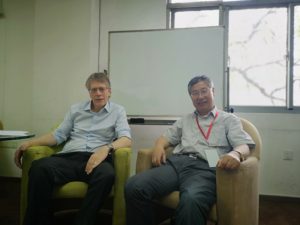I recently had the opportunity to return to Shanghai for a variety of interesting events. I had previously visited there in January of 2018. While previous visits provided me with some important new perspectives on the fascinating Chinese economy, this one was more oriented to professional conferences. I was the opening act for two conferences, both held at Fudan University. The first conference was the 2018 International Symposium on Financial Engineering and Risk Management (FERM 2018) at which I presented The Price of Macroeconomic Uncertainty with Tenuous Beliefs. While the conference features “risk management” in its title, my talk explored the consequences of taking a broader view toward uncertainty beyond the more narrow confines of risk. The second one was the China Meeting of the Econometric Society where I presented on Valuation Dynamics in Models with Financial Frictions. The Shanghai Advanced Institute of Finance (SAIF) organized a conference at which I presented on Confronting Economic Uncertainty. Finally, Grace and I had a very nice evening with some University of Chicago alumni in Shanghai sharing ideas and perspectives.

A very nice part of this visit was my opportunity talk informally to a variety of scholars. China’s most imminent probabilistic and stochastic control expert, Shige Peng, and I talked for a couple of hours about overlapping research interests. He has done some very innovative research on how to confront uncertainty in dynamic environments, a topic which I continue to work on. I talked at length to Chris Sims (my former advisor), briefly to Tom Sargent (my long-term collaborator), Jianqing Fan (my intellectual host and distinguished statistician), Xiaohong Chen (a former colleague and collaborator), and Jeffrey Lacker (former head of the Richmond Federal Reserve). Enrique Sentana, a longtime friend, give me a very generous introduction at the 2018 China Econometric Society meeting. I had many other productive and stimulating conversations that made this a packed week.
In terms of new perspectives on China, I was informed by a variety of sources about the local public finance challenges. In the past, local governments have faced some perverse incentives for engaging in public investments funded by land sales and sometime dubious financing arrangements through shadow banking. They typically do not have tax authority and rely in part from revenue from the central government. Local public finance challenges and stress for the financial system are some cause for concern. A recent paper that addresses some of these issues is, ”The Financing of Local Government in China: Stimulus Loan Wanes and Shadow Banking Waxes” by my colleague, Zhiguo He, and collaborators.
